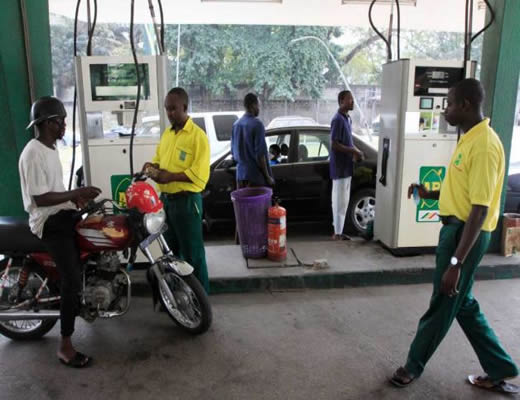Deregulation: Fuel Price May Rise To N200 Per Litre
There are indications that the Federal Government may be forced to accept sale of petrol at N200 per litre in the coming weeks.
In trying to find balance from a battered economy, worsened by COVID-19 pandemic and low oil revenue, Minister of Petroleum Resources, Timipre Sylva, had insisted that increasing the price had become inevitable.
With the increase in price of crude oil at the international market hovering at about $61.30 per barrel Wednesday, the landing cost of petrol, at the interbank official exchange of N379.5, is projected at N180 per litre.
Additional margin allowed by the Petroleum Products Pricing Regulatory Agency (PPPRA) stands at about N19. Wholesalers (depot owners) are allowed to charge a margin of N4, retailers charge about N6 and the Petroleum Equalisation Fund, about N9 on every litre. This is to allow stakeholders recover costs and make profit.
Nigeria had last year opted for deregulation of the downstream sector but has not been able to allow market forces dictate pump prices. The market has remained a monopoly with only the state oil company, the Nigerian National Petroleum Corporation (NNPC) — which has access to foreign exchange and swaps the country’s crude with refineries abroad — taking hold of the market.
Although the pump price of petrol was reduced immediately government deregulated the market following dwindling crude prices at the international market, the price had risen from N121.50 to N123.50 per litre in June; N140.80 to N143.80 in July and N148 to N150 in August. In September, pump prices rose further to N158 and N162 per litre.
When attempt was made to increase it in December last year, labour unions demanded the head of Sylva. They were furious over repeated hike in petrol price. The Nigerian Labour Congress (NLC) and Trade Union Congress (TUC) dragged the Federal Government to a dialogue, where NNPC agreed to slash the original N167.44 per litre by N5.
Sylva, however, said with no provision of subsidy in the 2021 budget and the inability of NNPC to continue to bear the cost of under-recovery, “NNPC needs to also think about optimisation of product cost because as we all know, crude oil prices are where they are today ($60).
With oil price benchmark of $40 per barrel in the 2021 budget, daily production estimate of 1.86 million barrels and high cost of oil production, Nigeria has had to rely on borrowing amid depleted revenue sources. This development made it impossible for government to return a subsidy regime, clouded with secrecy and regarded as a drainpipe of corruption.
Vice President of the Independent Petroleum Marketers Association of Nigeria (IPMAN), Abubakar Shettima, said that the ex-depot price, which was officially N143/litre, had moved to about N158/litre, making it impossible for petrol to sell at current pump price of N162 per litre.
“There is no change in price yet. But private depot owners have already changed their prices. The marketers are not happy at all because, despite the increase in price, most depots no longer have products; we are running at a loss.
“The private depots are the largest suppliers. They are selling at N158 per litre instead of N147. There is loss of about N8. There is an existing template from government that we must comply with,” Shettima said.
A reliable source at the marketers union, who pleaded anonymity, said that pump price of the product should ordinarily hover around N200 per litre, except for the role the NNPC is playing in cushioning the price.
The source noted that, while stakeholders in the industry were working hard in view of COVID-19 impacts, the industry could collapse or continue to compromise safety standards if marketers were unable to recover their costs.
Coming about 10 months after the purported deregulation of the downstream market, stakeholders in the industry are, however, unsettled regarding what has become of the policy even after the usual price hikes.




